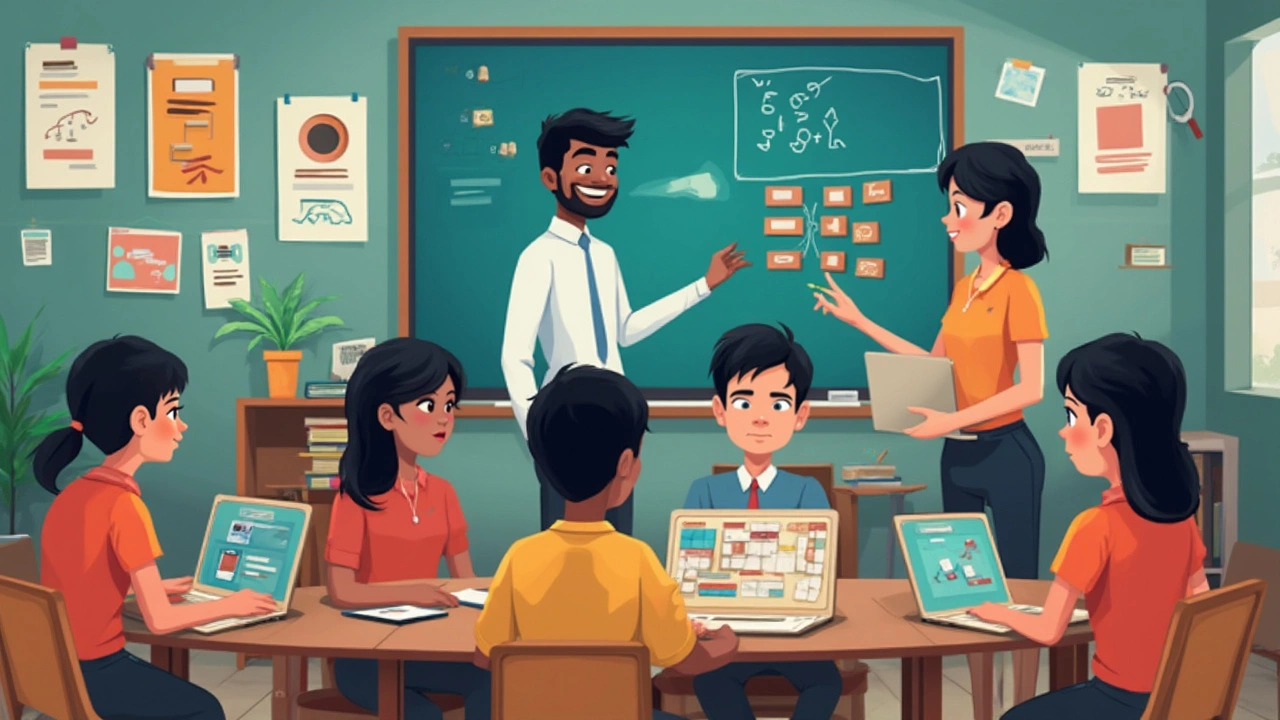Forget the idea that you need to be a math genius to start coding. Most coders spend their time reading, Googling, and figuring things out—just like anyone learning a new skill. Yeah, there’s some logic involved, but you wouldn’t believe how much of coding is just patience and trial-and-error.
Ever wonder why so many people think coding is super hard? A lot of it comes from staring at those endless lines of code you see in movies or on screens. In reality, you usually work on small, understandable chunks—and tools like autocomplete and debugging exist for a reason. Even pro coders mess up all the time. What makes the difference is not giving up when you hit a problem.
- Why People Think Coding Is Hard
- What Skills Make Coding Easier
- The Myths vs. Realities of Coding Jobs
- How to Start Coding Without Getting Overwhelmed
- When to Take a Coding Class (And What to Expect)
Why People Think Coding Is Hard
If you ask around, a lot of folks say coding seems impossible to pick up. This idea starts early—schools often don’t teach programming basics, so it feels totally foreign the first time you see it. Most people are used to writing essays or crunching numbers, not sending strict commands to a computer. That shift freaks many people out.
Movies and TV do a number on us, too. They show coders as these sleep-deprived geniuses pounding out lines of code at lightning speed, saving the world before lunch. In real life, coding isn’t fast or glamorous most of the time. It's more like googling error messages, reading online docs, and slowly building up solutions. The pressure to be perfect or "think like a computer" adds to the myth that it's only for a special type of brain.
Another reason is the sheer number of programming languages and tools out there. You hear words like Python, Java, HTML, CSS, GitHub, APIs—and it sounds overwhelming. Most people don’t realize that you don’t need to know them all. You just pick one, and learn from there. In fact, Stack Overflow’s 2023 report showed that 42% of professional developers still regularly search the web for answers.
On top of that, some people expect to "master" coding in a few weeks, and when that doesn’t happen, they feel dumb. Here's the thing: it’s totally normal to struggle. Even seasoned programmers feel stuck sometimes. The trick is to keep moving, ask for help, and not let frustration win. The first step is just getting past the idea that coding is some kind of magical, impossible skill.
What Skills Make Coding Easier
You don’t need a super-brain to start coding, but some everyday skills make the ride smoother. Problem-solving tops the list—think logic puzzles or even figuring out why your phone won’t connect to the WiFi. People who like troubleshooting usually pick up coding faster.
Being comfortable with coding basics like following instructions, breaking big problems into smaller ones, and asking "why isn’t this working?" helps a ton. You might be surprised—the famous Stack Overflow survey found that over 70% of professional coders taught themselves at least part of what they know. Curiosity and the willingness to look things up online can help you get past roadblocks way faster than just being good at math.
Communication is another skill nobody talks enough about. Coders work together, read other people’s code, and learn from forums or teammates all the time. Writing clear messages, commenting your code, or even just knowing when to ask for help makes things easier than going solo.
Here’s a quick table showing top skills that help beginners:
| Skill | Why It Matters |
|---|---|
| Problem-solving | Coding is mostly about breaking down and fixing problems |
| Attention to detail | Bugs come from typos or small mistakes—you gotta spot them |
| Patience | Coding rarely works the first time, so stick with it |
| Communication | Explaining bugs or solutions is part of the job |
| Reading comprehension | Docs and tutorials make sense only if you read well |
If you like playing logic games, following steps, and figuring things out, you’re already halfway there.

The Myths vs. Realities of Coding Jobs
There's a lot of hype around coding jobs, with some myths that just never seem to go away. Some people picture coders as lone wolves hunched over their computers, churning out flawless programs all night. The truth is way less dramatic and way more team-based.
First off, let's bust the idea that coders work alone in silence. Most real-life coding jobs involve constant teamwork. You'll chat on Slack, review each other’s projects, and work side-by-side with designers, testers, and customers. Soft skills, like the ability to listen and explain things, actually matter just as much as knowing how to write code.
Another common myth: coding is only for math wizards. Sure, understanding logic helps, but you don't need to love calculus. In fact, a lot of people who switch into programming come from backgrounds like art, education, or even sales. What helps more is the ability to stick with a problem and not get frustrated when things break.
Here’s one surprise: even seasoned programmers use Google constantly. They don't have every answer memorized. Copying solutions from Stack Overflow is standard—and teams expect you to search around when you get stuck. What matters more is knowing how to find things and fit them to your project.
And about salaries—coding pays well, but it’s not always a ticket to the top 1%. According to the US Bureau of Labor Statistics, the average software developer was making around $127,000 in 2024. Entry-level folks make less, especially outside big tech cities. Companies care about experience and the skills you bring, not just which programming languages you know.
- Coding jobs usually offer clear growth paths—juniors can become seniors, managers, or even move to product roles.
- Remote work is far more common now, but it takes discipline and good communication to thrive.
- Some jobs expect people to specialize (like front-end, back-end, or mobile), while others want "full stack" skills. Specializing can make job hunting easier at the start.
- Boring tasks exist, even in tech—fixing bugs and reading old code is part of the deal.
The bottom line? The best part of a coding job is the chance to keep learning and to see your work actually get used in real life. But it's rarely exactly like you see on TV—which is honestly a relief.
How to Start Coding Without Getting Overwhelmed
It’s easy to get lost trying to learn coding on your own. Just picking the first language you hear about isn’t the best move. If you know why you want to code—maybe to build apps, automate tasks, or switch careers—that’ll help you narrow down your path. For beginners, Python is a favorite because the syntax is simple and there are tons of free resources and tutorials online.
Don’t bother cramming a thick textbook. The trick is progress through small, hands-on projects. Start with basics like printing text, taking user input, or simple calculations. It keeps things real, and you can actually see stuff working. Here’s a step-by-step starter approach:
- Decide what you want to make—like a simple calculator, quiz, or basic website.
- Pick just one language to start (Python, for example).
- Find a trusted online resource; "freeCodeCamp" and "Codecademy" are good bets for structured lessons.
- Work through the first few modules. Don’t rush, and definitely don’t skip practice exercises.
- Join a free community (like Stack Overflow or Reddit’s r/learnprogramming) to ask questions and see people who had the same struggles.
- Once you finish your first tiny project, share it—even if it feels silly. Feedback keeps you motivated.
Trying to study for hours non-stop leads to burnout. A Harvard study from 2023 found that people remember skills better when they learn for 30-45 minutes, then take a short break. Also, you don’t need to learn everything at once. Even professional programmers search for how-to answers constantly.
To keep your progress on track, use simple tools that boost learning:
- Online code editors like Replit (for instant results with no setup)
- Browser bookmarks for go-to resources (Docs, YouTube, W3Schools)
- Note apps to save snippets or mistakes you want to avoid (Notion, Google Keep, or classic sticky notes)
Check out this data on how most people approach their coding journey:
| Learning Method | Started Alone | Took a Class | Joined a Community |
|---|---|---|---|
| 2024 Survey (Code.org, n=6000) | 38% | 27% | 35% |
Biggest takeaway: you don’t need to figure it all out on your own. Break the process into small, doable chunks, and use communities to stay motivated. One step at a time really works better than rushing and feeling lost.

When to Take a Coding Class (And What to Expect)
If you’ve tried online tutorials, YouTube videos, or free apps and still feel stuck, it might be a sign you’re ready for a real coding class. The best time to join one is when you want structured learning, feedback from actual humans, and a stronger push to keep going. Coding classes can speed up progress, especially if you like to ask questions and work with others.
People usually get more out of coding classes if they have a goal—maybe landing a new job, making a game, or automating boring stuff at work. Classes give you a clear path instead of random Googling. You get hands-on projects, regular practice, and actual deadlines (which helps if you struggle to stay motivated).
Here’s what usually happens in a coding class:
- Expect to spend the first sessions just making sense of basic stuff—writing simple programs, figuring out error messages, and understanding how to “think” like a programmer.
- Most classes are part lecture, part coding exercises. Practice is the big thing—20% theory, 80% doing.
- You’ll probably mess up a lot, but so does everyone else. Instructors and classmates are there to help you get unstuck.
- Group projects and code reviews are common. You learn by both writing your own code and reading others’ work (which is honestly just as useful).
One smart tip: don’t get hung up on learning the “perfect” language—Python, JavaScript, or whatever the class is teaching. The problem-solving skills are what really matter. Sometimes you’ll find courses that add job interview prep, networking, or pair programming, making the experience even more practical. And if you can, pick classes that actually offer real support outside of lecture hours—late-night coding questions happen more than you think!
